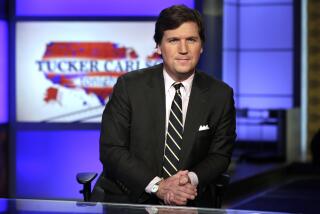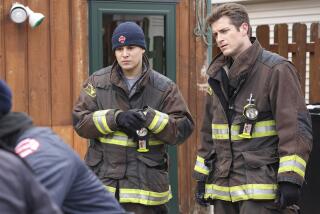PBS Scheduling Turns ‘War’ Into Ratings Winner : Television: Public TV programmers say they have learned a valuable lesson by packaging and promoting “Civil War” series as a single event.
- Share via
With its blockbuster series “The Civil War” attracting unusually large audiences, PBS executives were trying to figure out Wednesday what they’ve been doing right.
The premiere Sunday night was seen by an estimated 14 million viewers--the biggest audience ever for the debut of a PBS series--and the two subsequent installments drew the same 13% of the viewing audience in 24 major cities.
Beyond their normal quest for quality programming, public-TV executives said that a key lesson in the success of “The Civil War” is found in something as unglamorous as scheduling: Viewership goes up when PBS programs are packaged and promoted as events.
And for public television, where the old guard has been in an uproar for months over new programming chief Jennifer Lawson’s decision to change the way programs are presented to such an “event”-style format, that’s an important lesson.
“I think vindication is too strong a word, but it’s a very positive feedback for us that some of these new strategies in scheduling certainly work,” said John Grant, vice president of program scheduling and administration for the Public Broadcasting Service.
“The Civil War,” which was directed and co-produced by Ken Burns and his Florentine Productions with public television station WETA in Washington, D.C., could have been presented the old way, its 11 hours strung out over as many weeks in one-hour installments, Grant said. And under the old system, local stations would have had the freedom to schedule those installments whenever they wished.
Instead, PBS turned the lush production into a spectacle. It was programmed over five consecutive nights, and the air time for most stations was mandated by Lawson’s programming staff in Washington. (The final installment airs at 8 tonight on Channels 28, 15 and 24, and at 9 on Channel 50.)
PBS’ home video division prepared the series for simultaneous release on videocassette, and Los Angeles station KCET Channel 28 added to the event status by deciding to rerun the entire documentary in a daylong programming extravaganza Sunday, beginning at 8 a.m.
Because it was packaged as an event, executives believe, television critics gave the programs more attention than usual, treating it like an important special or miniseries. And General Motors, which backed “The Civil War,” was able to promote it as a significant attraction.
No one was suggesting that scheduling was the only factor in “The Civil War’s” success. Bill Kobin, president of KCET, said that there would not have been high ratings if the quality of the production were not good enough to compel continued viewing. And the topic of the war between the states has always drawn Americans’ attention, he said.
“It’s unusual in every respect, from the person whose idea it was to the ultimate end-of-the-line scheduling,” Kobin said. “I think its one of those situations where absolutely everything comes together.”
“The Civil War” is not the only series to be packaged as an event under the new PBS regime. Last week, “Frontline” aired a four-part report about the destruction of the rain forest. And public stations will broadcast “Race to Save the Planet,” a 10-hour series, over five consecutive nights beginning Oct. 7.
“I think (the new approach) does position us the way viewers tend to watch us,” Grant said, “as events and for a limited number of hours a week. They don’t watch us the same way they watch commercial TV.”
More to Read
The biggest entertainment stories
Get our big stories about Hollywood, film, television, music, arts, culture and more right in your inbox as soon as they publish.
You may occasionally receive promotional content from the Los Angeles Times.










